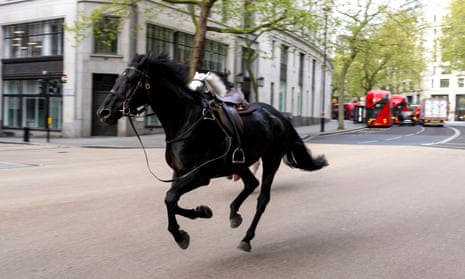Woah there, cried the nation. Easy, boy. This week’s most arresting visuals came on Wednesday morning when runaway horses brought central London to a standstill. Five working animals from the Household Cavalry, based at Hyde Park barracks, were on exercise when they were spooked by noises from a building site and dramatically broke loose.
The equine escapees caused chaos bolting through the capital, colliding with vehicles and startling pedestrians. They galloped for six miles, making it as far as Limehouse in the East End. Four people were taken to hospital. Two horses were left in serious condition. The footage was mesmerising, the images indelible. It elicited a giddy mix of fear and excitement, reminiscent of when a bird flies through an open window.
The saga of the fugitive nags gripped the nation. All day, #horses was a trending topic on social media, as if this was ye olde days. One ingenious Londoner swiftly mapped out a tribute pub crawl, following their route. Some speculated that the steeds were recreating the London Marathon, or relocating east for the buzzier social scene and saner property prices. Even a certain toff troubadour got involved. When the Daily Mail found a spurious celebrity angle, describing the army corps as “singer James Blunt’s old regiment”, he wryly tweeted “It’s always my fault, isn’t it?”
Yet amid all the dad-jokes – running for London mare, neigh-bourhood watch, mane road, stable condition, etc – another theme emerged. The visceral reaction of many was to regard the surreal spectacle as a harbinger of Armageddon. It didn’t help that the white horse, Vida, was drenched in blood. It was like the Four Horsemen of the Apocalypse had been hit by budget cuts. Conquest has taken voluntary redundancy. Death has been downsized. War and Famine were left with double the workload. Typical.
Wild-eyed, wounded horses on our city streets felt like an omen of end times. This must be how our god-fearing ancestors felt when unusual events occurred. Asteroids heralded the apocalypse. Volcano eruptions warned of imminent catastrophe. Dead birds ushered in a dark period of suffering and strife. On the same day as Horsegate, the hands of Big Ben froze and the red sails of Moulin Rouge windmill fell for first time in its 135-year history. It was like an alien invasion film or dystopian drama. To the bunker, batten down the hatches! We’re all doomed. In our hi-tech times, we would previously have scoffed at suggestions that such incidents signified anything sinister. Us 21st-century sophisticates are far too enlightened to indulge in superstitious mumbo-jumbo, right? Not anymore.
What does it say about us that we’re now prepared to indulge these thoughts? In these turbulent times, we see signs of catastrophe everywhere. Similar feelings were sparked by this month’s New York earthquake. Since the Covid pandemic, itself a sort of medieval plague, we’ve become more prone to interpreting random events as portents of disaster. High winds, hailstones or rampaging bloodied horses, suddenly it all feels like the end of days. If the ravens leave the Tower too, we’re really in trouble.
Michael Hogan writes about lifestyle and entertainment, specialising in pop culture and TV
Do you have an opinion on the issues raised in this article? If you would like to submit a letter of up to 250 words to be considered for publication, email it to us at observer.letters@observer.co.uk
